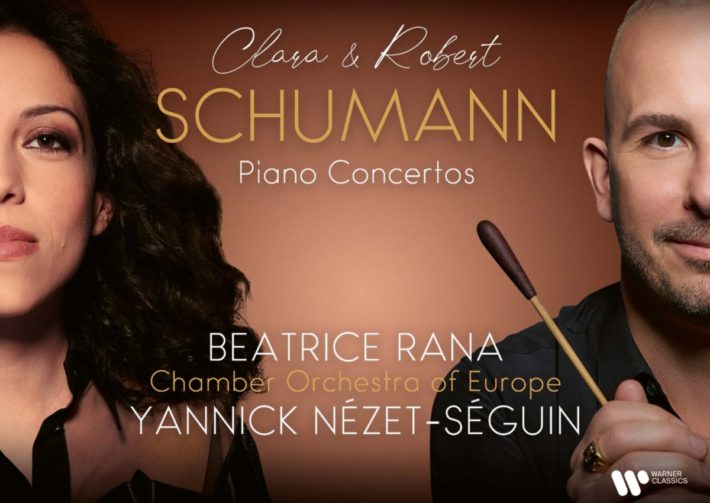Coming off two solo albums which I reviewed back in 2019 and 2021, I was excited to hear Beatrice Rana’s newest release, a collaboration with Yannick Nézet-Séguin on Clara and Robert Schumann’s piano concertos. I looked forward to gaining an insightful view on the way the two concerti reflect on one another, much in the way we see in the composers’ numerous letters. There are already some commonalities in place, of course: both are in A minor and started out as one-movement works. A closer look also reveals interesting motivic overlaps.
Given the scope of Clara Wieck’s Op. 7, it’s hard to believe she finished the work at the age of 16. The opening Maestoso derives its stateliness from the dotted rhythms to which the Chamber Orchestra of Europe gives a voluminous, fulfilling sound. The piano part is no easy pass from the start with thunderous octave passages that Rana handles with confidence and authority. She approaches the lyrical sections equally effectively: listen from 1:13 onwards for a Chopinesque bel canto, enhanced by the instrument’s prominently mellow tone. Rana never shies away from the broad phrases, as in 2:48: the yearning is made all the more realistic with a rhapsodic touch that she transforms ever so smoothly into the sprightliness of the F major section.
A cello solo toward the end of the first movement signals the transition into the Romanze (all the movements are attacca). The lengthy piano introduction shows Wieck’s experimentation with unexpected harmonic changes, and Rana uses them to their maximum effect, creating many detailed sonoric colors. The result is a soundscape that encompasses all sorts of personalities: passionate, dreamy, contemplative, and enigmatic. The movement largely comprises a duo with the cello, where we get to hear Rana as a chamber musician. She’s just as comfortable in a more accompanimental role, moving fluidly with and supporting the cellist in the rich melodic lines.The Finale is very much a showpiece for the pianist with scintillating intervallic runs, jumps, and skips. In all of her recordings, Rana’s flawless technique is something to marvel at, and nothing is different here. Her vitality in even the most difficult passages is further supported by the orchestra: a particularly triumphant interlude at 4:28 is sure to get the heart rate up (in a good way).
Related Posts
- Review: Schumann – Piano Concerto, Piano Works – Judith Jáuregui
- Review: Schumann – Complete Symphonies – Pablo Heras-Casado, Münchner Philharmoniker
- Review: Beethoven – Complete Symphonies – Nézet-Séguin, Chamber Orchestra of Europe
Robert Schumann’s Op. 54 bears resemblance to Clara’s concerto by way of the dotted rhythms of the opening. Here, I would have preferred crisper figures with less elision between the notes. Given the vibrance of the previous tracks, I also found the oboe and piano solos oddly subdued. In this regard, the historic Lipatti/Karajan recording really hits the mark: Lipatti preserves the rhythmic integrity of the small patterns in clearly enunciated chords. Meanwhile, the solos have a piercing clarity that plays right into to the pathos of Schumann’s lines. The orchestral interlude at 1:33 does open the door momentarily to extroversion I wanted to hear earlier, courtesy of the neat horns blasts. Throughout the movement, it’s obvious that Rana strives for finesse (especially in the softer sections) but this translates to a mildly frustrating and persistent want for just a little more, especially where sound and phrase contouring is concerned. Ironically, the piano’s tone mentioned earlier contributes to the sense of holdback. Rana’s cadenza, however, is impressive in how she delivers a symphonic sound to the grandest moments.
Nuance finds a better place in the coy middle movement, with the flute especially adding lovely, silvery touches where it appears. The performers capture the gaiety of the Finale (track 6) in the dancelike rhythms, and the long buildup of suspense in the conclusion is smartly managed.
The generous liner notes feature a conversation between the artists, who share their perspectives on each concerto; Jed Distler’s ensuing musical analysis is concise but enjoyable with its narrative tone. As for the sound engineering, I found it regrettably mediocre and uneven—parts of the Robert Schumann selection especially sound too boomy or too confined.
Although Clara Schumann’s concerto is the stronger of the two performances, this is still a solid recording of both works that combines Rana’s artistic sensitivities with Nézet-Séguin and the ernsemble’s balanced and integrated sonorities.

Clara & Robert Schumann – Piano Concertos
Beatrice Rana – Piano
Chamber Orchestra of Europe
Yannick Nézet-Séguin – Conductor
Warner Classics, 5419729625
Included with an Apple Music subscription:
Schumann Piano Concerto on Amazon
Read more classical music reviews or visit The Classic Review Amazon store











